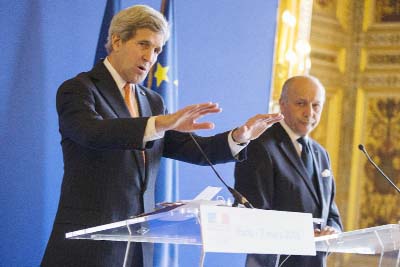
AP, Paris :US and European diplomats said Saturday they are united in their strategy and goal in trying to achieve a nuclear deal with Iran.”We are on the same page,” U.S. Secretary of State John Kerry said after talks with French Foreign Minister Laurent Fabius. “We know what we are chasing after and we are chasing after the same thing.”Kerry and Fabius, who met with the British and German foreign ministers after their session, cited progress in the talks, with the last round just wrapping up Wednesday in Switzerland. But they also acknowledged big gaps that must be bridged if the sides are to reach a deal by the end of March deadline set by negotiators.”There is progress in certain areas but there are also divergences,” Fabius said. He said more work needed to be done on the length of the proposed agreement and on how to verify Iranian compliance.”There is still work to do on the duration, we need a guarantee and transparency is necessary,” he said.Added Kerry: “We have exactly the same assessments. We have made progress but there are gaps. We need to close those gaps.”Their comments appeared to be at odds with those of a senior Iranian official said some roadblocks hindering an agreement had been cleared.Iran’s vice president, Ali Akbar Salehi, said technical impediments in the way of a final nuclear accord had been eliminated during the ongoing discussions with American negotiators.Salehi, who is also in charge of Iran’s nuclear agency, told Iranian state television on Saturday that Tehran offered proposals to remove “fake concerns” over the country’s nuclear program, paving the way for a final deal.The next round of nuclear talks is set to begin March 15, involving mainly U.S. and Iranian representatives. A small European delegation also will participate.That configuration has led to some complaints that the talks involving the five permanent members of the U.N. Security Council, Germany and Iran have become more of an American-Iranian project. Objections, notably from France over certain provisions, held up agreement on an interim deal with Iran in November 2013.

